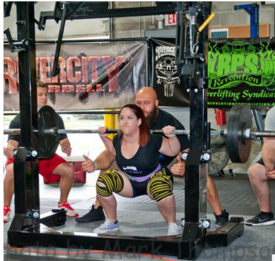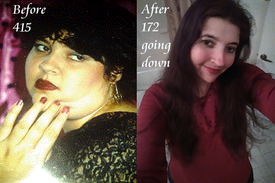Interviewing MFP legends: SideSteel

taunto
Posts: 6,420 Member
This is a small series of interviews conducted with certain MFP’ers who have been active in the community for a while now and are seen by many MFP users as knowledgeable, inspiring and in general, legends.

Todays guest is SideSteel. He is one of the people here who needs no introduction. He is an amazing dad who just had a baby daughter. He is considered one of the authorities on MFP when it comes to fitness information. He has the 6 pack that makes ladies go crazy (and me too!). He is insightful, inspiring and loves to educate others in the ways of fitness. In short, he is a legend. He is now also a fitness and body recomposition consultant who works with numerous clients on Skype to help them reach their fitness goals (yes, I am doing a shameless plug. He is paying me for that with noodes. Don’t judge me!)


Tell us about yourself? How did you got started on the fitness path and how did you endup on MFP?
About 14-15 years ago or so, I had a brief period of lifting. I used to smoke cigars and I was skinny fat and I wanted to change that. I managed to lift weights and kick the smoking habit for about 1 year or so. I had no idea what I was doing, but I ate a lot of food, I trained aggressively, and because of the phenomena known as "noob gains", I went from skinny fat to "fat but you look like you might lift a bit". For perspective sake I skipped leg day, didn't know how to squat or deadlift, and I thought my 1rm bench of 225 was amazing. I weighed in around 200lbs at the peak of this lifting stint, and I thought I was 12% bodyfat. It's very likely that I was well above the 18% range. I'm currently maintaining weight around 187lbs and I'm far leaner with much more LBM than I had back then. To be clear, I only mention this to try to paint a picture of what things were like back then vs now. I basically had no clue.
Heres a before/after

I had a large inguinal hernia that sidelined me from lifting, and after that I returned to my former skinny-fat self. Only this time much fatter. Fast forward to just under 4 years ago, and you would find me at 202lbs with a 38" navel measurement. You could see a gut protruding when I wore a shirt.
One early fall night I had met with a group of friends. One of these guys I haven't seen in 10 years. The last time he saw me I at least somewhat looked like I lifted and I didn't have this protruding beer gut. He entered the room, took one look at me, pointed to my belly and said:
"Dude what the [censored] is this? What happened?"
And that was it. It hurt, but I went home and I decided he was right. While I had made a few attempts previously to get in shape, this really lead me to see how out of shape I really was. I was in the gym the next day.
What was the next move? I mean, I go gym often and lift things but I don’t look anything like you. It maybe because you are white and I am Asian but still.
Well the first step was getting to the gym and moving stuff around. But that wasn't the moment where things really started progressing for me. I started reading on bodybuilding.com. I made some forum posts and quickly got my *kitten* handed to me. The most profoundly helpful moment was the moment that I decided that I didn't know everything about weight training and nutrition even though I had a small amount of success with it in the past.
The moment I was willing to be wrong was the moment I started learning a great, great deal. Thankfully (very, very thankfully) I was exposed to some really brilliant folks who changed my thinking about things. Alan Aragon being the most influential to me, and he still is to this day.
Previously I interviewed MireyGal and she told me pills are bad. I think she just doesn’t want to share her secret. Which pills do you endorse?
Just speaking generally about weight loss supplements, I think the majority of them have an effect ranging between completely useless and "might have a small effect". Collectively I'd shy away from them in favor of sound practices and this is especially true in people who are either beginning their fitness journey (cliche I know) or people who have had a history of dieting failures in the past. You might be able to make an exception for competitive physique athletes who are looking for an edge and even then it would depend on the supplement and how it's used.
I'd check out examine.com as a general resource on supplementation so you can see what the research shows.
Finally, disregard Dr. Oz as far as any supplement advice goes. He's got a track record of peddling the latest and greatest thing, and making claims that certainly don't have evidence supporting them.
We are bombarded by nutrition information. I saw an ad for bottled water saying “zero calories”. People talk about doing vegan, others say eat more meat. The information is everywhere. What are your thoughts about nutrition?
Here is my current opinion. This has changed over the past couple of years and as with any of my opinions, available evidence and my experience makes those subject to change.
This topic can bring up a lot of debate on the forums. On one side you have people who will insist that you must eliminate or avoid certain foods in favor of other foods with the ill-informed belief that specific foods are inherently fattening, and on the other side you have people who can get so die-hard about IIFYM that they bash the idea of eating whole foods and boast about the amount of ice cream or pop tarts they can fit into their diet. I may have even been guilty of this in the past myself, and honestly I find both sides to be quite silly.
Ultimately, it's up to the individual to choose the appropriate selection of foods to meet their nutritional (and caloric) needs. Now with that being said, food selection matters a great deal! Satiety is very important, adherence is very important, performance is very important. Food selection impacts these variables.
If I were to make a sweeping generalized recommendation it would be to eat several servings of fruits and green vegetables for micronutrient and satiety purposes. I would look to limit, but not necessarily eliminate, intake of heavily refined, low-nutrient, low-satiety foods strictly for purposes of blunting hunger, staying within intake goals, and meeting nutritional needs. It becomes a balancing act in a way, where ideally if you can fit in some treats and maintain performance, satiety, and calorie/nutrient needs then this is excellent and you'll probably enjoy your diet a great deal. But it's easy to get out of control with it, as I've seen in multiple clients. An intended 20% discretionary calories suddenly becomes 50% and satiety goes down and adherence is all over the place.
As far as eliminating foods, the consideration one has to make is that completely abstaining from certain foods could potentially cause people to crash and burn but I wouldn't make that a blanket statement that applies to everyone. The phrase "everything in moderation" sounds great but it can be misinterpreted quite badly. If you can't control yourself around that bag of potato chips, and having it in the house means you're going to eat two bags, then I can't fault anyone for eliminating that food item even if it's temporary.
Off the top of my head, reasons to eliminate foods outside of the obvious such as "don't enjoy eating the food":
1) Self control issues in that you can't adhere to proper portion sizes.
2) You just don't find it to be worth the calorie cost.
3) For whatever reason, you just don't feel good after eating it.
4) You'd rather eat a different food for performance/satiety reasons.
But I don't think things like "it will make you fat" or "it's a white carb therefore it's bad for me" are valid reasons to start chopping things out of your diet.
People really need to get in the mindset of viewing their diet as a whole rather than making good/bad judgments about individual food items in isolation. There are contexts in which regularly eating ice cream is a perfectly fine decision and there are other contexts in which it may be a poor decision for that person at that time. My point being, these things are context dependent and it's best to look at the big picture.
Finally, there have already been comparisons between white rice and brown rice so I won't get into that, but as a random aside, I really get angry at the potato avoidance. White potatoes are incredibly satiating and having increased my consumption of them, hunger levels reliably go down. That's a REALLY silly food to avoid if it's due to fear of it making you fat.
What about workouts? Somebody who is too overweight might not be able to run and I hear walking just doesn't do anything for weight loss.
Good question.
This is something that is context dependent. Most people would benefit from some form of resistance training. Now that being said, someone who is severely obese and completely sedentary (I'm using an extreme example here) may need to start with walking and build from there.
Since I believe that adherence is the biggest obstacle to success for most people, I'd also suggest that people choose enjoyable, or least objectionable activities. So for example if you hate the treadmill but you love playing tennis, then go play tennis and use that as your form of calorie expenditure.
On the resistance training front, there's many ways to get the job done. Programming will be goal dependent and mode of training has some room for preference. I would suggest that most people look at some basic resistance training programs rather than attempting to make their own and this is especially true for beginners. Most people who design their own programs quite frankly don't know how to manage the variables properly to build progress, and while they think they made a well rounded program with proper progression this is very seldom true based on what I've seen and mistakes I've made in the past (I did it too and looking back on it, it was laughable).
I hear weight lifting mentioned a lot on MFP. Isn’t weight lifting bad for girls? I mean, nobody wants to look at a female version of Brock Lesner I am sure.
Weight lifting is a very healthy activity that combats/offsets sarcopenia, improves bone density, promotes looking awesome and generally being a badass.
Most of the female bodybuilding figures that are promoted to the media are not accurate representations of what women would look like under non steroid-using conditions. This unfortunately promotes a very unrealistic image of what women would look like on a proper resistance training program. Building muscle takes years and it's difficult enough as a male even when you meticulously manage nutrition and training variables. As a female it's just not going to happen to the extent or degree that most people seem to anticipate based on their exposure to enhanced athletes with decades of training experience and good genetics.
Cliffs: Lifting is a great idea for both genders.
which workout would you say is good for me? And which workout do you do?
I train 4 days per week and my training is essentially movement based. I back squat 3 out of those 4 days (fronts 1 day), I bench 3 out of those 4 days, I deadlift 2 of the 4 days, and accessories are distributed within the program. I train in multiple intensities and rep ranges.
But what I do is not relevant to what some readers of this thread may need. And even looking at what a beginner may need will still depend on some context since some people may need to start out by getting off the couch and walking.
Weight lifting is often mentioned as the way to go, and while I fully support it as being a really good idea for most people, it's not a reality for some people at some times.
For the majority though, getting on a formal exercise program of some sort will do great things as I mentioned earlier. And within that framework, I'd make sure that the program has people training the entire body over the course of the week (preferably multiple times). I'd make sure there is some form of progression associated with the program.
While I could talk about exercise selection, rep ranges, volume, etc -- those things are goal/context dependent and I don't know that it's possible to hash all of it out to cover all the reading population.
I would caution people from designing their own routine without having some knowledge about how to manipulate those variables. Hiring a trainer could be a viable option, learning about programming on your own could be a good option, looking at some pre written programs and viewing the elements they share could be a good thought experiment. (All Pros, Madcow, Stronglifts, Starting Strength for examples).
What motivates you to get up and do these workouts? I am specifically asking you about the days when you don’t want to get out of bed and have lost all hope and don’t wanna do anything and this goes on for weeks, how do you pump yourself up.
So for someone who hasn't reached a place where the process is enjoyable, my answer might sound fake, but here it is:
My workouts do not require motivation. I absolutely love lifting. The process itself is enjoyable to me.
When I first started it was a means to achieve a goal (not be fat, acquire aesthetics), but somewhere along the way it became more about the process and less about the end result. I go to the gym because I enjoy getting under a barbell.
The big question in my mind is, how do we create this joy in others. I think one piece to that puzzle is establishing multiple metrics to keep a positive feedback loop, gym performance being one of those many metrics. I certainly don't think it's going to work with all people but it may be helpful to some.
And now for the last question. Tell me a question that you wish I, a new comer on MFP, had asked you.
I think that by and large there's a gigantic focus on things that more data oriented and less behavior oriented.
For example you'll see a lot of questions about trying to nail down the perfect macronutrient ratio, or when to consume protein, or how many meals to eat, or whether or not someone should do squats or leg press, or whether someone has the right training program, etc.
It's not that these things aren't important. They all have contextual value. But better questions might be "why can't I stick to my diet" or "how can I blunt hunger" or "how can I build sustainable habits" or "why do I eat mindlessly".
Adherence to a diet is basically where the success is and asking questions or utilizing methods that build better adherence is probably where the focus should be.
We know that calorie deficits create fat loss. We know that "eat less, move more" is a generic descriptor to attempt to create that deficit. But the real trick is getting people to actually do it.
Thank you Sir. You are a gentleman and a scholar. Unfortunately, I am not and will have to post one last pic


Todays guest is SideSteel. He is one of the people here who needs no introduction. He is an amazing dad who just had a baby daughter. He is considered one of the authorities on MFP when it comes to fitness information. He has the 6 pack that makes ladies go crazy (and me too!). He is insightful, inspiring and loves to educate others in the ways of fitness. In short, he is a legend. He is now also a fitness and body recomposition consultant who works with numerous clients on Skype to help them reach their fitness goals (yes, I am doing a shameless plug. He is paying me for that with noodes. Don’t judge me!)


Tell us about yourself? How did you got started on the fitness path and how did you endup on MFP?
About 14-15 years ago or so, I had a brief period of lifting. I used to smoke cigars and I was skinny fat and I wanted to change that. I managed to lift weights and kick the smoking habit for about 1 year or so. I had no idea what I was doing, but I ate a lot of food, I trained aggressively, and because of the phenomena known as "noob gains", I went from skinny fat to "fat but you look like you might lift a bit". For perspective sake I skipped leg day, didn't know how to squat or deadlift, and I thought my 1rm bench of 225 was amazing. I weighed in around 200lbs at the peak of this lifting stint, and I thought I was 12% bodyfat. It's very likely that I was well above the 18% range. I'm currently maintaining weight around 187lbs and I'm far leaner with much more LBM than I had back then. To be clear, I only mention this to try to paint a picture of what things were like back then vs now. I basically had no clue.
Heres a before/after

I had a large inguinal hernia that sidelined me from lifting, and after that I returned to my former skinny-fat self. Only this time much fatter. Fast forward to just under 4 years ago, and you would find me at 202lbs with a 38" navel measurement. You could see a gut protruding when I wore a shirt.
One early fall night I had met with a group of friends. One of these guys I haven't seen in 10 years. The last time he saw me I at least somewhat looked like I lifted and I didn't have this protruding beer gut. He entered the room, took one look at me, pointed to my belly and said:
"Dude what the [censored] is this? What happened?"
And that was it. It hurt, but I went home and I decided he was right. While I had made a few attempts previously to get in shape, this really lead me to see how out of shape I really was. I was in the gym the next day.
What was the next move? I mean, I go gym often and lift things but I don’t look anything like you. It maybe because you are white and I am Asian but still.
Well the first step was getting to the gym and moving stuff around. But that wasn't the moment where things really started progressing for me. I started reading on bodybuilding.com. I made some forum posts and quickly got my *kitten* handed to me. The most profoundly helpful moment was the moment that I decided that I didn't know everything about weight training and nutrition even though I had a small amount of success with it in the past.
The moment I was willing to be wrong was the moment I started learning a great, great deal. Thankfully (very, very thankfully) I was exposed to some really brilliant folks who changed my thinking about things. Alan Aragon being the most influential to me, and he still is to this day.
Previously I interviewed MireyGal and she told me pills are bad. I think she just doesn’t want to share her secret. Which pills do you endorse?
Just speaking generally about weight loss supplements, I think the majority of them have an effect ranging between completely useless and "might have a small effect". Collectively I'd shy away from them in favor of sound practices and this is especially true in people who are either beginning their fitness journey (cliche I know) or people who have had a history of dieting failures in the past. You might be able to make an exception for competitive physique athletes who are looking for an edge and even then it would depend on the supplement and how it's used.
I'd check out examine.com as a general resource on supplementation so you can see what the research shows.
Finally, disregard Dr. Oz as far as any supplement advice goes. He's got a track record of peddling the latest and greatest thing, and making claims that certainly don't have evidence supporting them.
We are bombarded by nutrition information. I saw an ad for bottled water saying “zero calories”. People talk about doing vegan, others say eat more meat. The information is everywhere. What are your thoughts about nutrition?
Here is my current opinion. This has changed over the past couple of years and as with any of my opinions, available evidence and my experience makes those subject to change.
This topic can bring up a lot of debate on the forums. On one side you have people who will insist that you must eliminate or avoid certain foods in favor of other foods with the ill-informed belief that specific foods are inherently fattening, and on the other side you have people who can get so die-hard about IIFYM that they bash the idea of eating whole foods and boast about the amount of ice cream or pop tarts they can fit into their diet. I may have even been guilty of this in the past myself, and honestly I find both sides to be quite silly.
Ultimately, it's up to the individual to choose the appropriate selection of foods to meet their nutritional (and caloric) needs. Now with that being said, food selection matters a great deal! Satiety is very important, adherence is very important, performance is very important. Food selection impacts these variables.
If I were to make a sweeping generalized recommendation it would be to eat several servings of fruits and green vegetables for micronutrient and satiety purposes. I would look to limit, but not necessarily eliminate, intake of heavily refined, low-nutrient, low-satiety foods strictly for purposes of blunting hunger, staying within intake goals, and meeting nutritional needs. It becomes a balancing act in a way, where ideally if you can fit in some treats and maintain performance, satiety, and calorie/nutrient needs then this is excellent and you'll probably enjoy your diet a great deal. But it's easy to get out of control with it, as I've seen in multiple clients. An intended 20% discretionary calories suddenly becomes 50% and satiety goes down and adherence is all over the place.
As far as eliminating foods, the consideration one has to make is that completely abstaining from certain foods could potentially cause people to crash and burn but I wouldn't make that a blanket statement that applies to everyone. The phrase "everything in moderation" sounds great but it can be misinterpreted quite badly. If you can't control yourself around that bag of potato chips, and having it in the house means you're going to eat two bags, then I can't fault anyone for eliminating that food item even if it's temporary.
Off the top of my head, reasons to eliminate foods outside of the obvious such as "don't enjoy eating the food":
1) Self control issues in that you can't adhere to proper portion sizes.
2) You just don't find it to be worth the calorie cost.
3) For whatever reason, you just don't feel good after eating it.
4) You'd rather eat a different food for performance/satiety reasons.
But I don't think things like "it will make you fat" or "it's a white carb therefore it's bad for me" are valid reasons to start chopping things out of your diet.
People really need to get in the mindset of viewing their diet as a whole rather than making good/bad judgments about individual food items in isolation. There are contexts in which regularly eating ice cream is a perfectly fine decision and there are other contexts in which it may be a poor decision for that person at that time. My point being, these things are context dependent and it's best to look at the big picture.
Finally, there have already been comparisons between white rice and brown rice so I won't get into that, but as a random aside, I really get angry at the potato avoidance. White potatoes are incredibly satiating and having increased my consumption of them, hunger levels reliably go down. That's a REALLY silly food to avoid if it's due to fear of it making you fat.
What about workouts? Somebody who is too overweight might not be able to run and I hear walking just doesn't do anything for weight loss.
Good question.
This is something that is context dependent. Most people would benefit from some form of resistance training. Now that being said, someone who is severely obese and completely sedentary (I'm using an extreme example here) may need to start with walking and build from there.
Since I believe that adherence is the biggest obstacle to success for most people, I'd also suggest that people choose enjoyable, or least objectionable activities. So for example if you hate the treadmill but you love playing tennis, then go play tennis and use that as your form of calorie expenditure.
On the resistance training front, there's many ways to get the job done. Programming will be goal dependent and mode of training has some room for preference. I would suggest that most people look at some basic resistance training programs rather than attempting to make their own and this is especially true for beginners. Most people who design their own programs quite frankly don't know how to manage the variables properly to build progress, and while they think they made a well rounded program with proper progression this is very seldom true based on what I've seen and mistakes I've made in the past (I did it too and looking back on it, it was laughable).
I hear weight lifting mentioned a lot on MFP. Isn’t weight lifting bad for girls? I mean, nobody wants to look at a female version of Brock Lesner I am sure.
Weight lifting is a very healthy activity that combats/offsets sarcopenia, improves bone density, promotes looking awesome and generally being a badass.
Most of the female bodybuilding figures that are promoted to the media are not accurate representations of what women would look like under non steroid-using conditions. This unfortunately promotes a very unrealistic image of what women would look like on a proper resistance training program. Building muscle takes years and it's difficult enough as a male even when you meticulously manage nutrition and training variables. As a female it's just not going to happen to the extent or degree that most people seem to anticipate based on their exposure to enhanced athletes with decades of training experience and good genetics.
Cliffs: Lifting is a great idea for both genders.
which workout would you say is good for me? And which workout do you do?
I train 4 days per week and my training is essentially movement based. I back squat 3 out of those 4 days (fronts 1 day), I bench 3 out of those 4 days, I deadlift 2 of the 4 days, and accessories are distributed within the program. I train in multiple intensities and rep ranges.
But what I do is not relevant to what some readers of this thread may need. And even looking at what a beginner may need will still depend on some context since some people may need to start out by getting off the couch and walking.
Weight lifting is often mentioned as the way to go, and while I fully support it as being a really good idea for most people, it's not a reality for some people at some times.
For the majority though, getting on a formal exercise program of some sort will do great things as I mentioned earlier. And within that framework, I'd make sure that the program has people training the entire body over the course of the week (preferably multiple times). I'd make sure there is some form of progression associated with the program.
While I could talk about exercise selection, rep ranges, volume, etc -- those things are goal/context dependent and I don't know that it's possible to hash all of it out to cover all the reading population.
I would caution people from designing their own routine without having some knowledge about how to manipulate those variables. Hiring a trainer could be a viable option, learning about programming on your own could be a good option, looking at some pre written programs and viewing the elements they share could be a good thought experiment. (All Pros, Madcow, Stronglifts, Starting Strength for examples).
What motivates you to get up and do these workouts? I am specifically asking you about the days when you don’t want to get out of bed and have lost all hope and don’t wanna do anything and this goes on for weeks, how do you pump yourself up.
So for someone who hasn't reached a place where the process is enjoyable, my answer might sound fake, but here it is:
My workouts do not require motivation. I absolutely love lifting. The process itself is enjoyable to me.
When I first started it was a means to achieve a goal (not be fat, acquire aesthetics), but somewhere along the way it became more about the process and less about the end result. I go to the gym because I enjoy getting under a barbell.
The big question in my mind is, how do we create this joy in others. I think one piece to that puzzle is establishing multiple metrics to keep a positive feedback loop, gym performance being one of those many metrics. I certainly don't think it's going to work with all people but it may be helpful to some.
And now for the last question. Tell me a question that you wish I, a new comer on MFP, had asked you.
I think that by and large there's a gigantic focus on things that more data oriented and less behavior oriented.
For example you'll see a lot of questions about trying to nail down the perfect macronutrient ratio, or when to consume protein, or how many meals to eat, or whether or not someone should do squats or leg press, or whether someone has the right training program, etc.
It's not that these things aren't important. They all have contextual value. But better questions might be "why can't I stick to my diet" or "how can I blunt hunger" or "how can I build sustainable habits" or "why do I eat mindlessly".
Adherence to a diet is basically where the success is and asking questions or utilizing methods that build better adherence is probably where the focus should be.
We know that calorie deficits create fat loss. We know that "eat less, move more" is a generic descriptor to attempt to create that deficit. But the real trick is getting people to actually do it.
Thank you Sir. You are a gentleman and a scholar. Unfortunately, I am not and will have to post one last pic

0
Replies
-
 SS is a great person, and I'm honored to call him a long-time friend on here. 0
SS is a great person, and I'm honored to call him a long-time friend on here. 0 -
TL;DR
Joking...0 -
Holy smokes. That's a lot of love for SideSteel.
Good job sidesteel.0 -
Love! ♡Sidesteel helped me begin ma journey to get supa bulky. He's awesome0
-
:flowerforyou:0
-
This content has been removed.
-
But 5 minutes of cardio would still kill him dead.
SS"s version of cardio is just lifting weights faster.0 -
Great Post0
-
 0
0 -
another great interview. Thanks OP.
 SS 0
SS 0 -
He has always been extremely helpful, great post!0
-
Legendary!
Working with SS was a game changer for me. Thanks OP and SS!0 -
100% IN.
Love the talk about nutrition.0 -
I really
 that guy. He's so good at communicating on a level that most of us can understand even when talking about the more complex topics. 0
that guy. He's so good at communicating on a level that most of us can understand even when talking about the more complex topics. 0 -
You know... I have always liked the way SideSteel writes. Very concise.
Thanks SideSteel... and taunto!0 -

If I get myself backed into a corner that I can't seem to get out of, he's always the one I message to point me in the right direction, and he's been more than willing to help!0 -
This never ceases to crack me up!

I me some SideSteel. MFP would not be the same without him, and I say this from experience. :flowerforyou: 0
me some SideSteel. MFP would not be the same without him, and I say this from experience. :flowerforyou: 0 -
Great post! *0
-
Awesome stuff!0
-
Great interview!0
-
A SIDESTEEL MEME! A SIDESTEEL MEME! A SIDESTEEL MEME!
I think I've been asking to see one again for a couple years now.
Love your FACE, Mister! Great interview!0 -
I love these things.0
-
Lots of GREAT information
 0
0 -
who is SideSteel?
i've been here for a long, long time and the name doesn't ring a bell.0 -

well done sir
\m/0 -
You just got tagged.0
-
LOVE THIS!!! Thank you for all the information, SS. Loved reading it, and feel like I understand more than I did when I entered.
Great Job Taunto!0 -
Thanks Taunto..love this
 0
0 -
SS you rock! your posts have helped me so much.
taunto.. great interview!0 -
:drinker:
Appreciate the good info and helpful advice he puts out.0
This discussion has been closed.
Categories
- All Categories
- 1.4M Health, Wellness and Goals
- 398.1K Introduce Yourself
- 44.7K Getting Started
- 261K Health and Weight Loss
- 176.4K Food and Nutrition
- 47.7K Recipes
- 233K Fitness and Exercise
- 462 Sleep, Mindfulness and Overall Wellness
- 6.5K Goal: Maintaining Weight
- 8.7K Goal: Gaining Weight and Body Building
- 153.5K Motivation and Support
- 8.4K Challenges
- 1.4K Debate Club
- 96.5K Chit-Chat
- 2.6K Fun and Games
- 4.8K MyFitnessPal Information
- 12 News and Announcements
- 21 MyFitnessPal Academy
- 1.5K Feature Suggestions and Ideas
- 3.2K MyFitnessPal Tech Support Questions



























